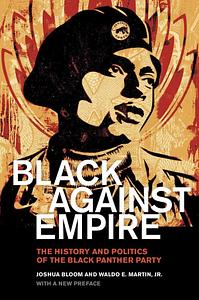Take a photo of a barcode or cover
166 reviews for:
Black against Empire: The History and Politics of the Black Panther Party
Joshua Bloom
166 reviews for:
Black against Empire: The History and Politics of the Black Panther Party
Joshua Bloom
the way this book took me 13 months to finish… anyways…. If you’re looking for a textbook on the black panther party, this is it. with all the details you could ever desire — but be prepared for that as it is hefty.
Essential reading. If people understood the power structures the Panthers faced I think the world would be a much different and better place than it is. There has obviously been progress in the past 50 years in many regards, however there is a mountain of importance that has, on a foundational level, remained unchanged.
A fantastic analysis of the BPP, especially why they declined and what that means for the US as a whole. Very well done.
Highly recommend. Although probably would've been better to read it, rather than listen to the audiobook. A lot of great details that I had to rewind to listen to.
This book was excellent. I believe it provides a balanced view of the BPP. While you might agree or disagree with some of their tactics, what they were fighting for then is just as relevant now. If you don't believe that #FakeNews exists hearing what the FBI did to the BPP back then without the help of the internet should make you question everything you read now.
dark
informative
inspiring
medium-paced
My understanding of the Black Panther Party is fundamentally clearer and more defined after reading this incredibly detailed and dense piece of work. A must read for anyone who wants to really dive into the formation, rise and demise of the party. The most surprising realization for me was the immense financial and legal support BPP received from allies, especially on a collegiate level and global scale.
My biggest frustration lies in justice, equity and liberation being viewed by allies as a trend, a temporary convenience. The immense support previously mentioned was so short lived and begin to falter when federal, state and local officials "gave" black people mere crumbs. Understanding that our current social climate is yet another repeat of such mindsets is a hard pill to swallow.
Due to the 2016 published date, I feel a revised conclusion from Bloom is necessary. It would be interesting to hear the author's analysis of BLM and the current push for radical liberation and self-determination as it relates to the same attempts BPP sought.
My biggest frustration lies in justice, equity and liberation being viewed by allies as a trend, a temporary convenience. The immense support previously mentioned was so short lived and begin to falter when federal, state and local officials "gave" black people mere crumbs. Understanding that our current social climate is yet another repeat of such mindsets is a hard pill to swallow.
Due to the 2016 published date, I feel a revised conclusion from Bloom is necessary. It would be interesting to hear the author's analysis of BLM and the current push for radical liberation and self-determination as it relates to the same attempts BPP sought.
A complete history covering the the party, it's members, it's accomplishments and the circumstances swirling around of those. The analysis of the circumstances surrounding the party is particularly helpful. This analysis helps to both dispel myths around the party and explain the swift rise and swift fall of the party.
Random thoughts: I really appreciate how grounded, multi-disciplinary and comprehensive the Black Panther philosophy and politics are. This trait extends to their direct action as well, often having achievable short-term goals that both make a difference in people's lives today and advance their long-term goals.
They make a note that after being called "reformist", the Black Panther Party defined reform as changes that do not aim to change the power structure and revolutionary as changes that do aim to change the power structure. Despite the enormous amount of wiggle room in that definition, I think this is an important distinction to keep in my mind. Partially because it seems to imply that the efficacy of what you're doing does matter and small steps can be revolutionary. Turns out semantics matter a lot
Learning about and thinking about the Black Panthers pulls at a philosophical tension within me that I want to explore further. That tension is between: 1) the belief that state power comes primarily from violence and that violence is an effective challenge to state power, and 2) I don't believe in using violence against persons, in particular capital punishment. The Panthers appear to walk this line by credibly threatening violence as self-defense while not actively pursuing violence. It is something that I will be chewing on for awhile
Random thoughts: I really appreciate how grounded, multi-disciplinary and comprehensive the Black Panther philosophy and politics are. This trait extends to their direct action as well, often having achievable short-term goals that both make a difference in people's lives today and advance their long-term goals.
They make a note that after being called "reformist", the Black Panther Party defined reform as changes that do not aim to change the power structure and revolutionary as changes that do aim to change the power structure. Despite the enormous amount of wiggle room in that definition, I think this is an important distinction to keep in my mind. Partially because it seems to imply that the efficacy of what you're doing does matter and small steps can be revolutionary. Turns out semantics matter a lot
Learning about and thinking about the Black Panthers pulls at a philosophical tension within me that I want to explore further. That tension is between: 1) the belief that state power comes primarily from violence and that violence is an effective challenge to state power, and 2) I don't believe in using violence against persons, in particular capital punishment. The Panthers appear to walk this line by credibly threatening violence as self-defense while not actively pursuing violence. It is something that I will be chewing on for awhile
Black Against Empire is a phenomenal volume by two respected UC historians, chronicling the formation, rise, and decline of the Black Panther Party and its key members. For a side of the struggle for Black liberation that doesn't tend to get publicized, this is a really good, thorough exploration. It's also very hard to read, as one would expect. Organizations like the Black Panthers exist for a reason, and BaE demonstrates plenty. The book ends with an exploration of why no revolutionary group like the Panthers was formed before the 1960s and why none has formed since, and it seems to hit pretty close to the mark, although it does kind of forget about ACT UP just a decade and a half later. What's really great about this book is that it treats the Panthers as their own movement, not just an outgrowth of the Southern Civil Rights Movement, and so brings the reasons for a revolutionary Black Power organization to exist much closer to home for us Northerners.
One of the best accounts of a contemporary social movement that I've ever read. Admittedly I think it does a better job tracing the rise of the Party than tracing its fall, but given the limitations of its length and the dearth of previously-existing scholarship it's just about perfect.




